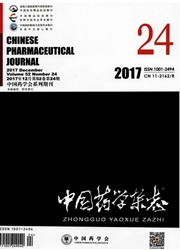

 中文摘要:
中文摘要:
目的 研究香青兰总黄酮对大鼠心肌缺血再灌注损伤诱导的自噬作用。方法 采用结扎左冠状动脉前降支的方法,缺血30 min,再灌120 min,构建大鼠在体心肌缺血再灌注损伤模型。分别给予香青兰总黄酮(30 mg·kg^-1·d^-1)灌胃、自噬激活剂(1 mg·kg^-1·d^-1)与抑制剂(25 mg·kg^-1·d^-1)腹腔注射预处理。观察梗死面积、血浆乳酸脱氢酶(LDH)、肌酸激酶同工酶(CK-MB)和组织凋亡蛋白caspase-3的活性及从蛋白与RNA水平检测自噬相关蛋白LC3、Beclin-1的表达。结果 自噬抑制剂组能减轻缺血再灌注导致的心肌损害,减少梗死面积及心肌酶溢漏,降低凋亡蛋白caspase-3的活性;香青兰总黄酮预处理显著减少自噬相关蛋白LC3、Beclin-1的表达。结论 香青兰总黄酮对心肌缺血再灌注损伤心肌中的自噬有明显抑制作用,抑制自噬可能是香青兰总黄酮抗心肌缺血作用的主要机制。
 英文摘要:
英文摘要:
OBJECTIVE To explore the effects of Dracocephalum total flavonoids (TFDM) on myocardial ischemia/reperfusion in- jury(MIRI) induced autophagy in rat. METHODS In vivo MIRI model was established with ischemia 30 rain and reperfusion 120 min, by ligation of left anterior descending coronary artery. TFDM (30 mg · kg -1· d -1 ) and autophagy activator( 1 mg· kg- 1· d -1 ) or inhibitor(25 mg · kg- 1 ·d- 1 ) pretreatment was given before making the model. The MIRI-induced infarct size, the activities of lac- tate dehydrogenase( LDH), creatine kinase isoenzyme(CK-MB) in plasma and apoptosis protein caspase-3 in tissue and the expression level of autophagy-related proteins LC3, Beclin-1 were observed. RESULTS Compared with model group, the experiment revealed that autophagy inhibitor alleviated MIRI-induced myocardial damage by decreasing the infarct size, myocardial enzyme LDH and CK- MB leak; and reducing apoptosis protein caspase-3 activity level. In addition, TFDM pretreatment significantly inhibited the expression of autophagy-related proteins LC3 and Beclin-1. CONCLUSION TFDM shows inhibitory effects on MIRI-induced autophagy, which may play an important role in the protection against MIRI.
 同期刊论文项目
同期刊论文项目
 同项目期刊论文
同项目期刊论文
 期刊信息
期刊信息
